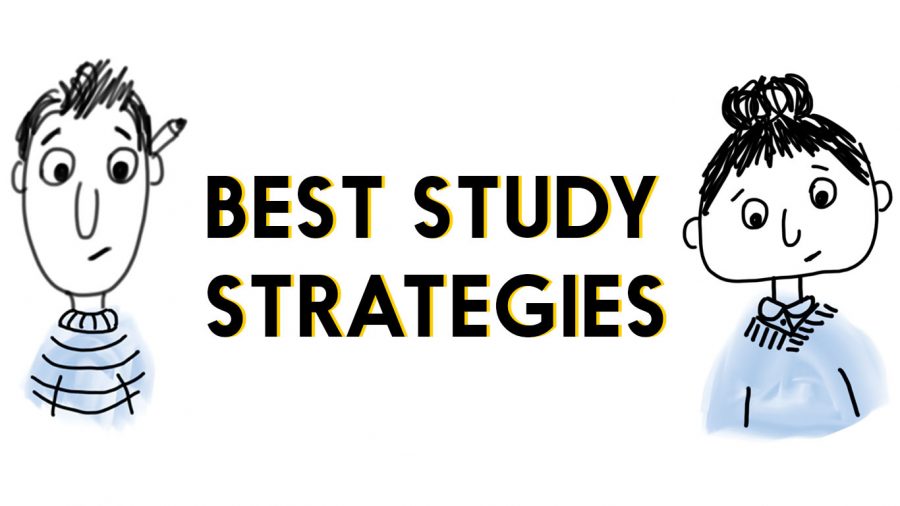Best study strategies
May 24, 2019
Part 1 – Debunking the Myth
The scene is all too familiar — students cramming for that last-minute final at midnight, hunched over a messy desk, with notebooks and textbooks covered in yellow streaks of highlighter and short summaries littered with colored sticky notes. With the unyielding clock ticking every minute, there’s a moment of fleeting panic. There’s a lot of information, but what’s the best way to take it in? Most students fall into the usual routine of re-reading highlighted lines, summaries and pouring hours into reading textbook chapters again and again until they hope the material will somehow stick in their brains. It’s no surprise that when they get their grade back, it’s less than desired.
The biggest problem lies with the study techniques used, namely highlighting, re-reading and summarizing. Almost every student has used these techniques, yet according to scientific research they are the lowest effective methods to actually learn information.
Throughout years of studying and course work, students have never been taught how to study the most effective way.
Despite the beautiful notes and detailed summarizes, studies show that current methods are actually very ineffective, unless students are specifically trained to summarize and note-take the right way, which few are. However, the study techniques are so popular because of their perceived effectiveness and the fact that many never learned how to study and had to develop their own methods.
“I think the main reason students aren’t taught effective study tips is that examinations are largely related to memorization at earlier ages. Students either observe or hear that the best way to remember something is to continue looking at it over and over again until you perceive some level of retention,” said Lucas Halvorson, an assistant at the University of Iowa Tutor Center, an organization dedicated to helping students succeed on campus by teaching a variety of skills, like basic study strategies and habits.
Hundreds of years of research actually prove that there’s one method that prevails above all — it goes by the name of active recall, and it’s by far the least used technique among students.
Part 2 – The Evidence/Definition
The common myth among many students is that the process of learning is centered around feeding information to the brain and then retrieving it during the exam.
The study technique of active recall is completely different from that way of thinking.
Active recall is a process where students retrieve information from their brain instead of constantly just feeding information to the brain. Studies show that when students retrieve information, they strengthen the connections in the brain that are necessary to do well in tests.
“Active recall is superior to standard study methods like re-reading, highlighting and basic listening as it’s actually proven to improve student grades pretty substantially,” Halvorson said. “When you review you can actually close your eyes and develop the concept without any visual or audible aids, as if you were in an exam. Studies show that if you’re able to actively recall information without the implicit support of highlighting or looking over information, you’ll actually be able to not only understand but apply the information or topic.”
Active recall isn’t just a conjecture, but a method that’s actually backed up by numerous scientific studies. One specific study took place at Washington University in St. Louis, where scientist Henry L. Roediger studied a group of college students that were each given the same exact exam containing 40 foreign language vocab pairs to learn and review. Following the review, all the students were given an exam and once they all knew the content, the scientist assigned each student one of the following four actions.
- The student would continue reviewing and be frequently tested on the word pairs
- The student no longer reviewed, but would only be frequently test on the word pairs
- The student just reviewed and would not be tested
- The student no longer studied and would not be tested
All of the students returned a week later and were given an almost identical follow-up test.
“The results showed that the active recall students were able to remember an average of 80 percent of the vocab words, whereas the review group remembered just 34 percent on average compared to the control group. The active recall group was 50 percent more successful than the basic review group,” Halvorson said. “[The study shows that] the replication of an exam environment ensures that your brain is able to store information as long-term, which would take 12 months of basic review to accomplish without the practice of active recall.”
Later on in 2011, a study on retrieval practice procedures by Karpicke and Blunt was implemented with further realizations. A group of scientists split students into four different groups. The first group was instructed to study an assigned chapter once. The second group was told to study and read it exactly four times. The third group studied it once and afterwards made a mind map, and the fourth group was told to read the chapter once and recall as much of it as possible.
Then, all the students were tested in two phases. The first phase tested on verbatim — the material and facts right from the text. The students in the third and fourth group did remarkably better, proving that even reading the chapter once and then just trying to recall the information is way better for tests than just re-reading a chapter multiple times — and a much better use of time.
The second phase tested on inference — the ability of a student to apply the learned information, and the students who used active recall did significantly better than the groups that studied just studied the chapter.
Finally, the scientists asked the students before conducting the study what method they thought would be the best. They rated repeated study as the best and rated active recall as the least effective, showing that students’ own intuitive ideas don’t match up with what proven studies show.
“I think it’s just a common misconception that [highlighting, re-reading and summarizing] are observed as the most effective way to retain information, mostly because it’s intuitive that hammering information over and over again should help us remember it,” Halvorson said. “It’s accurate for short term memory, but in reality it’s more the case that strategies to test that review will actually ensure the student has the information in their long term memory to succeed in the classroom.”
Part 3 – Specific Strategies
Despite a new study technique that may seem daunting, there are many easy ways to incorporate it into a study session.
The first method is to make notes with the textbook closed. Read an assigned chapter once and then close the textbook. Write down as much as you can about the topic. When you’re done, open the textbook up again and go over the details you missed.
The second method is an alternative way to engage with the text. Read the chapter once, and then take a piece of paper to write questions for yourself over the material. When you re-read the chapter, answer your written questions on the way so that you’ll engage in cognitive effort to retrieve information from your brain.
No matter what, it’s not impossible to begin active recall, no matter how intuitive and seemingly easy the traditional methods seem to work.
“I think it’s really as easy as taking a moment during your study and review time to block off the answers or close your eyes and try not only to repeat back facts, but build the concept and its related ideas in your mind without any help,” Halvorson said.
Not only will learning active recall help students do better on tests, but also teaching them how to develop life-long skills and habits to succeed in the future.
“There are so many benefits to actually learning how to study. Learning study skills will not only help you in future endeavors, especially in college, but will also help you establish skills to succeed in life. Good study skills can increase your confidence, competence and self-esteem. They can also reduce anxiety about tests and deadlines,” said Halvorson. “By developing effective study skills, you may be able to cut down on the number of hours spent studying, leaving more time for other things in your life.”





